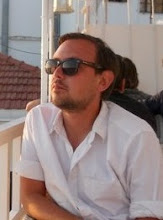
I counted 10 dead bodies in the first 20 minutes of The Good, the Bad and the Ugly, some crumpled in a dark saloon, some slumped under the unblemished white arches of an isolated ranch, still others baking in the colorless desert sun. Individually, and even to an extent en masse, the deaths make no lasting impact; like footprints in the dust, their outlines mark the ground momentarily before winds of change irrevocably carry them away.
But the sheer volume of bloodshed, in so short a span, reminds one that the West, as Sergio Leone envisions it, is a heartless place where death nearly always comes earlier than expected.
If one believes in God, and one imagines that a West like this would make it hard to, then it might not be an outlandish hallucination to picture Him galloping along, spurring his horse on, shooting at will.
In the subgenre of film that came to be called the "spaghetti Western," for its American genre and Italian director-producers, it sometimes seems as though the only impetus not to kill as you please is the fear of being killed in retribution, the eye-for-an-eye clause having become a kind of binding legal document of the irreligious.
This sense of murder as duty-bound runs throughout the genre, but in Leone's "Man with No Name" trilogy, anchored by Clint Eastwood's hardened, almost Christ-like figure, it reaches orgiastic pitch. The films seem to combine the sensibilities of two national myths, in which age-old codes have laid out rocky paths in the otherwise empty desert. To stray is to lose a sense of definition.
Leone's films revise the myths to question the veracity and morality of earlier genre exemplars, to question the existence of God by showing murder among the devout. In essence they ask, "Are you there, God? It's me, America." Our national myth, of individual liberty and the immigrant success story, becomes instead the true tale of death and destruction we have ignored for so long, the number of dead bodies that pile up merely a representative portion of the untold millions who have fled or been killed in our wake.
If the frontier is the American experience, then the spaghetti Western makes the point, clearly, forcefully, under an unrelenting sun, that even the good guys, the quiet ranchers who never marched into towns and saved damsels with guns blazing, are culpable for something.
By the time we see Clint adding four to the body count --- first a voice off screen, a heavy presence seeming to stand behind us as though we, too, are party to the robbery --- the myth is dead. God, too, must be dead, because his angel Gabriel has just kicked some major ass.
We are meant, by such an introduction, to cheer for Clint because he's Clint, and a righteous one at that. But modern audiences, savvy to political terror on a grander scale, are equipped to see the myth for what it is: a myth. And thus our heroes begin to drift silently away --- and The Good, the Bad and the Ugly begins to seem a little heavier with the weight of my own repressed feelings of violent anger, misanthropy, vigilantism. Leone's film is a reminder, first and foremost, of what is unacceptable but unavoidable in terms of the human heart. Indeed I see Clint as a figure from the Bible or the Odyssey, those two epic works of fiction: someone we may love but can no longer believe, because he pulled the trigger.

No comments:
Post a Comment